Resilient Raymond
Micro-Preemie Masters Movement as Inpatient and Outpatient
Raymond has got some serious moves.
The 14-month-old can roll over, push himself up to a sitting position and even use both hands to play with toys. Some pretty impressive skills considering what he had to overcome.
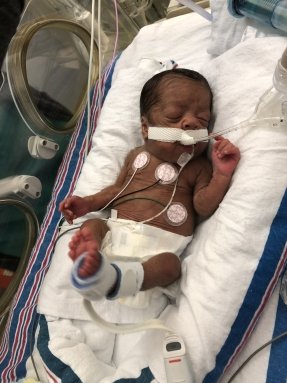
In January 2018, an unexpected pre-term delivery brought him into the world at just 25-weeks gestation. The micro-preemie weighed just two-pounds, about as much as an iPad.
Raymond’s fight for survival began immediately inside the NICU at Westchester Medical Center (WMC). Within weeks, he underwent his first surgery to repair a congenital heart defect called a patent ductus arteriosus (PDA) ligation. He also relied on a mechanical ventilator to breathe amid respiratory complications and other health issues stemming from Raymond’s extreme prematurity.
“He was diagnosed with bronchopulmonary dysplasia (BPD), severe chronic lung disease, supraventricular tachycardia (SVT), feeding difficulties which required a nasogastric feeding tube, hypothyroidism and other medical conditions,” said Raymond’s mother, Amy Hernandez. “He had ups and downs to the point where they told me he might not make it.”
Dr. Dennis Davidson, Unit Chief for the Infant and Toddler Unit of Blythedale Children’s Hospital, and neonatologist at WMC was part of the medical team that was able to turn the tide and bring improved respiratory function to the baby boy from Yonkers.
“If it wasn’t for his [Dr. Davidson’s] magic, I don’t know where my son would be right now,” said Amy. “Blythedale was recommended to help Ray with his lungs, breathing, feeding and therapies.”
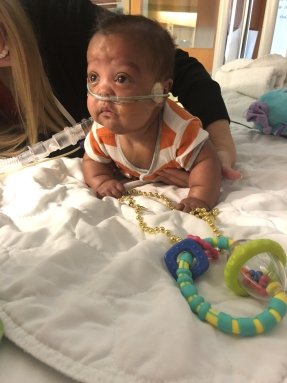
When Raymond was medically stable and strong enough to leave the NICU, he was admitted as an inpatient to Blythedale Children’s Hospital for ventilator weaning, feeding and occupational therapies, plus, training for his parents to learn how to care for a medically complex child.
From day one, Blythedale’s interdisciplinary team comprised of doctors, nurses and therapists, got to work restoring Raymond.
“We started working with him on his visual skills, like following his mother and visitors with his eyes, then moving on to head control,” said Sarah Teixeira, MS, OTR/L, Blythedale occupational therapist. “Over time, he was able to handle more movement, more hand skills and just his overall ability to engage with the world.”
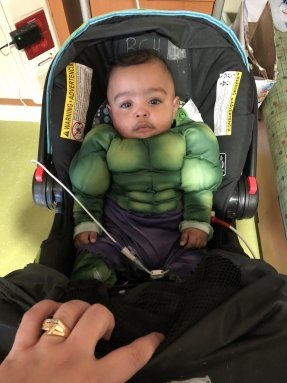
In less than five months at Blythedale, Raymond’s weight had nearly doubled due to improved feeding strategies and placement of a gastrostomy tube, plus, he was partially weaned from some of his respiratory support devices.
So, in November 2018, Raymond and his parents were notified they were to be discharged from the hospital to head home for the first time. Raymond’s mom wanted to make sure there was a plan in place to continue his top-notch medical care with Blythedale clinicians while they were back at home in order to prevent any potential medical setbacks.
“We had a meeting with his medical team and they made it work by introducing us to Blythedale’s Outpatient Therapy Program,” said Amy. “Because if it wasn’t for any of the therapies here, we wouldn’t be moving this fast or this good.”
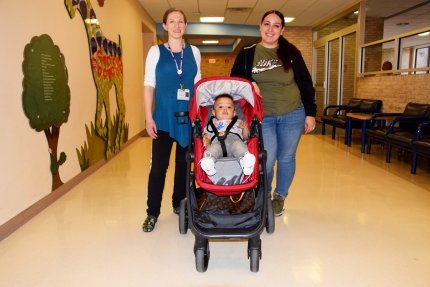
Days after going home, Raymond returned to his beloved Blythedale family to begin participation in the newly reopened Outpatient Therapy Program that includes physical therapy, occupational therapy, speech therapy, feeding therapy and assistive technology.
“Children are referred to and evaluated by Blythedale, then we customize a plan of care for each child,” said Scott Klein, MD, MHSA, Executive Vice President, Chief Operating Officer and Chief Medical Officer at Blythedale Children’s Hospital. “We had a lot requests to care for children in the community, so we upped our capacity and saw an almost 75 % increase in our Outpatient Therapy Program.”
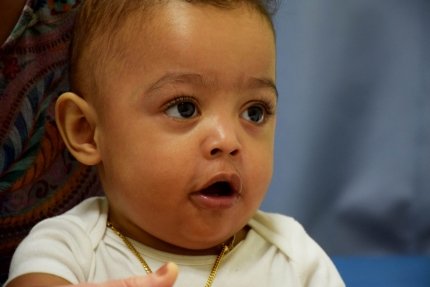
During the next few months, the results of this reinvigorated program proved reassuring as the toddler exhibited significant health improvements. Raymond’s feeding therapy enabled him to achieve more oral intake of foods with varied textures and tastes, while occupational therapy promoted Raymond’s upper-extremity strength and endurance, positioning, stability, and play skills.
“I don’t think there’s ever a day that goes by where I’m not surprised by the progress I see in the children I treat here,” said Sarah Teixeira. “Their resilience, joy and strength impress us every day.”
The success of outpatient therapy for Raymond and his family also helped introduce them to another growing initiative at Blythedale Children’s Hospital - Health Home Care Management. This program brings Blythedale’s comprehensive care of medically complex children and extensive knowledge of community resources or services to the patient’s home.
Raymond was enrolled in January.
“We’ve secured outpatient community doctors for him, worked on additional Early Intervention services, helped his family with medical supplies and more,” said Christina Horelick, LMSW, Care Manager for Blythedale’s Health Home program. “We want to smooth any bumps in the road which may occur from having a medically complex child home for the first time, while also being a support system to parents.”
That’s something that’s very important to Raymond’s mom, who values the proximity and professionalism of the Outpatient Therapy Program, while praising Health Home Care Management for its tailored family-centered approach.
“It’s very good for the community because it’s local, it’s easy and you don’t have to worry about going upstate to get special services for a special-needs child,” said Raymond’s mom. “Just look at my son now, it’s amazing. You can’t stop him.”



